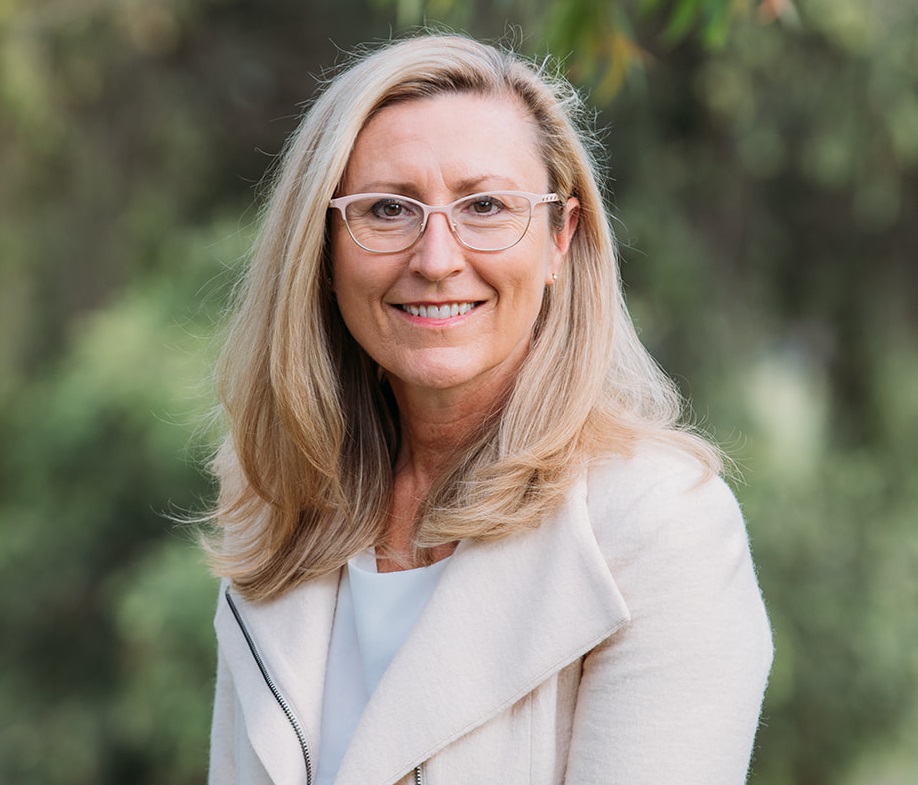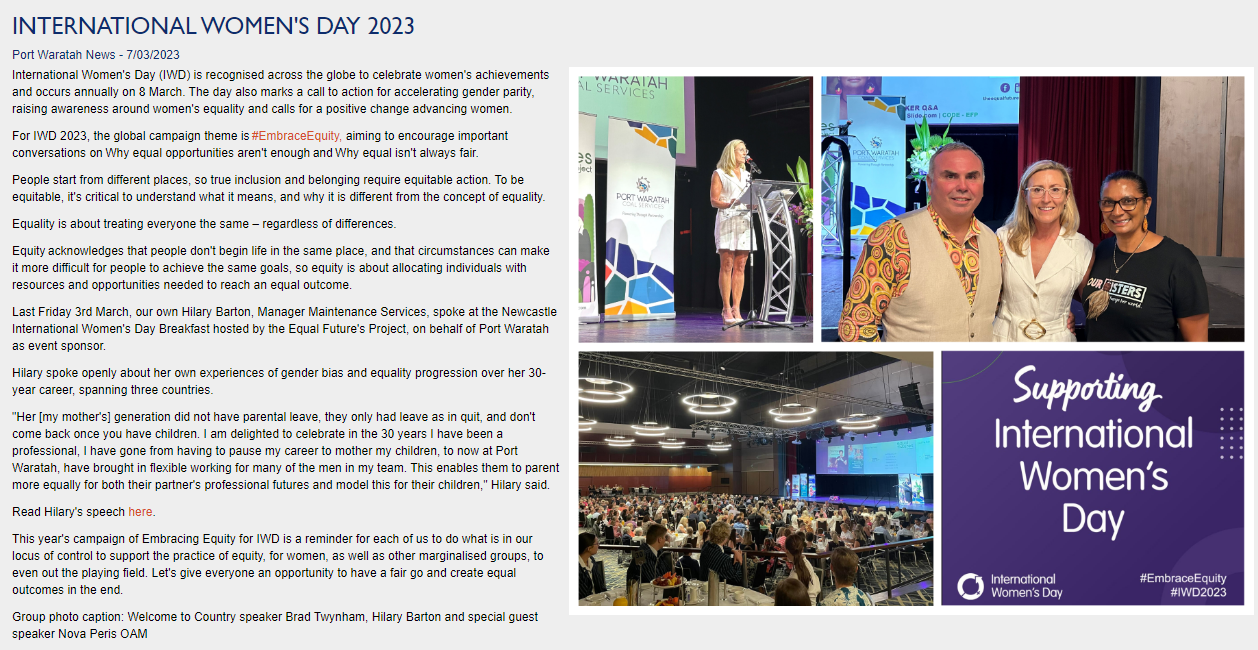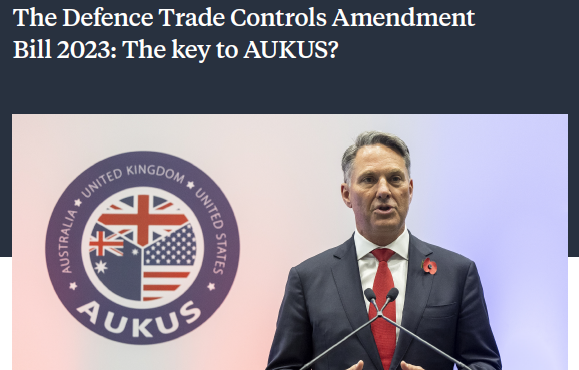On Friday 3rd March 2023 Hilary Barton (one of Goal’s Non-Executive Directors and wife of our CEO) spoke at the Newcastle International Women’s Day Breakfast on behalf of Port Waratah, where Hilary is employed as Manager Maintenance Services.
This years theme was #EmbraceEquity and Hilary gave some insight around her own experiences of gender biase and equality progression.
Read the full speech below:
Thank you and welcome all. I would also like to acknowledge the traditional owners of the land on which Port Waratah Operates, the Worimi and Awabakal people and pay my respects to their elders, past present and emerging and anyone here today of Aboriginal or Torres Strait Islander heritage.
Port Waratah is delighted to once again be in this room supporting Equal Futures to celebrate International Women’s Day and especially with our lady of firsts, Nova Peris and to hear her story.
Many of you are likely living the dreams or have been encouraged by the dreams of our mothers, grandmothers, aunties and others.
You may also be women of firsts in your families, workplaces, and communities. You may be the first to go to university, to travel overseas, take up mountain biking, or even a musical instrument.
Today, we also celebrate your stories when we shine a light on how we are uniquely women yet commonly connected in this story of progress for everyone to have an equal future.
My mother was born in 1930, where an equal future for women was still a dream, as her choices were limited to nun, schoolteacher, or nurse.
Whilst I am certain my mother had no desire to be a Mechanical Engineer, I am certain she would have preferred to have had more options. Her generation did not have parental leave, they only had leave as in quit, and don’t come back once you have children.
I am delighted to celebrate in the 30 years I have been a professional, I have gone from having to pause my career to mother my children, to now at Port Waratah, have brought in flexible working for many of the men in my team. This enables them to parent more equally for both their partner’s professional futures and model this for their children.
This is just one of many changes that diversity, inclusion and equality efforts have delivered that we can all be proud of. Perhaps you watched the World Pride Parade in Sydney last weekend and were moved as I was by the volume and variety of stories of diversity there.
My story whilst not Olympic, certainly has had its hurdles along the way.
I first encountered gender discrimination many years ago as a university student when I applied to work on Canada’s tall ship, the Bluenose. I had extensive sailing experience as a teenager and had acquired my captain’s papers and was driving a private ferry service for a tourist company on Halifax harbour at the time. I believed I was a perfect candidate. I dreamed of sailing the world on this iconic schooner for a gap year. My application was rejected because they did not have female crew quarters on board. Being the youngest of 8 kids who grew up in a small house with one bathroom, I was shocked that the actual “head” that was in the way of my equal future was a simple toilet.
Not long after this however I am delighted to tell you things got better and a friend of mine ended up being the first girl crew member on the Bluenose, as they eventually modified the vessel thanks to the influence of her father who was prominent man in our community.
In 1983, the year I graduated high school, Sally Ride became the first American female astronaut to go to space, 22 years since the first human space flight in 1961. She was one of many women who inspired me to have a career in science and engineering. In 2019, 36 years after Sally, NASA celebrated its first all women spacewalk, which involved only 2 women. It took them 36 years to find another woman to go for walk? Painfully slow! But this is progress still.
In 1927, Elsie MacGill graduated from the University of Toronto to become the first female Engineer in Canada. This was 20 years after my engineering school in Nova Scotia opened in 1907. Women did not appear there until fifty-four years later, and only 2 out of a graduation class of 80 in 1961.
I am proud to tell you that in 1989 myself and 10 other women out of several hundred men during my time there formed the first all-female soccer team in its history, as we had just enough to play without any spares.
I am also proud to share that also whilst I was at university, one of my somewhat biased professors, when I asked him a challenging question during a lecture, started yelling at me in front of my all-male class “why don’t you study cooking instead”, in hopes I might rethink my career path. Much to his dismay, I chose instead to finish the course and bake him a cake, which I decorated like an engineering drawing to let him know I could do both. He sought me out and shook my hand at my graduation, which was his way of admitting he had recalibrated his views.
Just after I graduated, sadly, my theory that it would be smooth sailing for women in my profession for an equal future was shattered.
At an Engineering college in Montreal Quebec, one of Canada’s thankfully few but no less horrific school shootings occurred. Just before the Christmas break in December 1989 an angry and armed young man rounded up the women in the school and shot killed 14 of them and injured another 10 women and 4 men in the process.
In this terrible story, the dreams and future achievements of many ladies of firsts were wiped out. Whilst there was a significant mental health story behind the shooting, it was chilling to think firstly that could have been me, and my soccer team, and also what was breeding this hatred for female engineers? Especially when there are so few of us?
So, I really cherish that we are now talking about equal futures, and not one future at the cost of another. As JFK once said, “a rising tide can lift all boats” and this is also relevant for equality.
In my early career, I was often subjected to unfair questions in interviews and questionable practices in onboarding medicals as a female of childbearing years that my male colleagues were not.
Another product of those times was pornography at work. As a young engineer I regularly had to attend the machine shop where the walls were covered in Playboy’s finest centrefolds and the Snap-on Tools poster advertised a lot more than a bunch of spanners.
I often had to hold technical discussions with men in these workshops and I used to wonder how they would have coped if it was reversed, and they were surrounded by a gallery of male parts.
Thankfully this too has changed, and the workplace is more inclusive and respectful, but there is still more to do.
Whilst we have moved the dial on nudity, toilets continue to be a mark of progress for women. In many cases I was the first or only female engineer in the team and female facilities were often only in the admin buildings or some distance from my desk. I realised that I had made the big league when a company converted a first aid room to a female loo just for my arrival. I am also proud to say in one of my recent roles in Australia in the 2000s, I was able to pay that forward by leading a program of work to install toilets on trains as well as implement feminine hygiene options for the female locomotive drivers that did not exist previously.
In all these stories of struggle and achievement, it has been diversity and inclusion that has enabled progress.
The most innovative companies that I have worked for, which included high tech electronics and medical device inventors, had highly diverse talent.
It is not a surprise to me that Australia’s chief scientist, recently in the press was calling for more diversity in STEM, as we need our brightest brains to bring our nation forward and these brains live in the bodies of all sizes, ages, cultures and genders.
Port Waratah has been part of our community, loading coal for export for over 45 years for the region. I am happy to advise I sit in a diverse executive team which is 60% women, as well as multinational and multi aged, and I have the privilege of leading the most diverse maintenance team there to date. We have ladies of firsts in our trades’ teams, as well as across our technical staff teams, and more broadly across our business.
Port Waratah supports me to be a mentor for women in the Resources sector and I have learned so much from being a mentor and commend anyone here today who has also shared their time and talent with others. We need to hold the ladders and open the doors for those beside us and those coming along after us.
At Port Waratah we acknowledge the work of being inclusive never stops but we are making continued progress to be a more inclusive organisation.
Many of you here would also be inspiring this progress. Don’t ever doubt how small things can have a big impact in how you show up at work, simply by being what needs to be seen, diverse, equal. There are many ways to contribute to an equal future.
In closing, I thank you and look forward to our special guest Nova.
I’ll leave you now with the words of Tracy Chapman, from her song of hope for a better future “fast car”, to consider the amazing impact of something as simple as inclusion:
I had a feeling that I belonged. I had a feeling that I could be someone.





